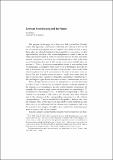Lewisian scorekeeping and the future
Abstract
The purpose of this paper is to draw out a little noticed, but (I think) correct and important, consequence of David Lewis’s theory of how the values of contextual parameters are determined. According to Lewis (1979), these values are often determined at least in part by accommodation; to a first approximation, the idea is that contextual parameters tend to take on the values they need to have in order for our utterances to be true. The little-noticed consequence of Lewis’s way of developing these ideas is that what we say is determined in part by the way the conversation unfolds after our utterance. That is, Lewisian accommodation entails a non-standard form of externalism, according to which what we say is determined not only by factors internal to us at the time of our utterance, nor even by truths about our physical or social environment at the time of utterance or by our history, but also by truths about our future—truths about times after the time of our utterance. Seeing this consequence clearly lets us refine and improve upon Lewis’s account of when accommodation can occur.
Citation
Ball , D 2019 , ' Lewisian scorekeeping and the future ' , Croatian Journal of Philosophy , vol. 18 , no. 54 , pp. 375-384 . < https://www.ceeol.com/search/article-detail?id=734580 >
Publication
Croatian Journal of Philosophy
Status
Peer reviewed
ISSN
1333-1108Type
Journal article
Collections
Items in the St Andrews Research Repository are protected by copyright, with all rights reserved, unless otherwise indicated.

